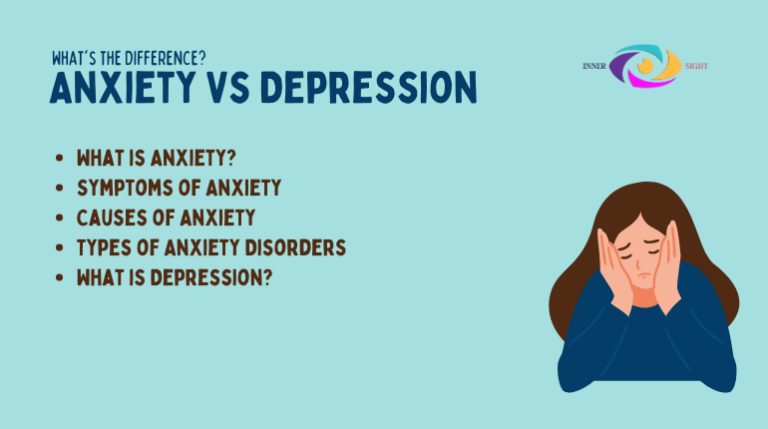Supporting a Loved One with Anxiety or Depression: Tips and Strategies
Anxiety and depression are common mental health conditions that can affect anyone. If someone you care about is struggling with anxiety or depression, you may feel helpless or unsure of how to help. However, there are many things you can do to offer support and help your loved one feel less alone. In this article, we’ll explore some practical tips for supporting someone with anxiety or depression.
Understand the Basics of Anxiety and Depression
Before you can offer effective support, it’s important to understand the basics of anxiety and depression. Anxiety is a feeling of worry, nervousness, or unease about something with an uncertain outcome. Depression is a mood disorder characterized by persistent feelings of sadness, hopelessness, and a lack of interest in activities. While anxiety and depression can be different, they often co-occur and share many similarities. Both conditions can be caused by a combination of biological, environmental, and psychological factors.
Avoid Stigmatizing Language
When talking to your loved one about their mental health, it’s important to avoid stigmatizing language. Stigma can make people feel ashamed or embarrassed about their mental health, which can prevent them from seeking help. Instead, use supportive and non-judgmental language. For example, instead of saying “Just snap out of it,” try saying “I’m here for you and I want to help.”
Validate Their Feelings
Validation is an essential part of supporting someone with anxiety or depression. It means acknowledging and accepting your loved one’s feelings without judgment. You can validate their feelings by saying things like “I can see that you’re struggling” or “It’s understandable that you feel this way.” Validation can help your loved one feel heard and understood, which can be comforting.
Offer Practical Help
Practical help can be a powerful way to offer support. Depending on your loved one’s needs, practical help can include things like cooking meals, running errands, or helping with household chores. Offer to help in specific ways, rather than just saying “Let me know if you need anything.” This can help your loved one feel more comfortable accepting your help.
Encourage Them to Seek Professional Help
While you can provide emotional support, it’s essential to encourage your loved one to seek professional help. This can include therapy, medication, or other forms of treatment. Offer to help them find a mental health professional or accompany them to appointments. Keep in mind that seeking professional help can be a daunting prospect for some people, so be patient and supportive.
Be There for Them
Showing up for your loved one, even if it’s just to sit with them or take a walk together, can be a powerful way to offer support. Let them know that you are there for them, and don’t be afraid to check in on them regularly. If your loved one is comfortable with it, you can even help them develop a safety plan for when they are feeling particularly anxious or depressed.
Help Them Practice Self-Care
Self-care is an essential part of managing anxiety and depression. Encourage your loved one to engage in activities that bring them joy, such as exercise, meditation, or spending time with loved ones. Help them develop healthy habits around sleep, nutrition, and exercise. Self-care can also include avoiding triggers, such as alcohol or caffeine, that can exacerbate anxiety or depression.
Self-Care for Caregivers
Supporting someone with anxiety or depression can be emotionally taxing, so it’s essential to take care of yourself as well. Make sure that you are getting enough rest, eating well, and engaging in activities that bring you joy. Consider seeking support from a therapist or support group to help you manage your own emotions and stress. Remember that you can’t pour from an empty cup, and taking care of yourself will help you better support your loved one.
Conclusion
| Precautions to Take to Help Your Loved One with Anxiety or Depression |
| Listen without judgment |
| Avoid stigmatizing language |
| Validate their feelings |
| Offer practical help |
| Encourage them to seek professional help |
| Be there for them |
| Help them practice self-care |
| Take care of yourself |
| Seek support from others if needed |
Supporting a friend or family member with anxiety or depression can be challenging, but it’s also incredibly important. By understanding the basics of anxiety and depression, avoiding stigmatizing language, validating your loved one’s feelings, offering practical help, encouraging them to seek professional help, being there for them, and helping them practice self-care, you can make a significant difference in their life. Remember to take care of yourself as well, and don’t be afraid to seek support from others. Together, you can help your loved one on their journey toward mental wellness.
Contact Us
Finding the right life coach for you
Finding the right life coach for you is important. Look for a coach who specializes in anxiety and depression, has a proven track record of success, and whose coaching style aligns with your needs and preferences.
Let Us Help You
At Inner Sight, we provide life coaching services to help individuals achieve their goals, improve their mental health, and overcome challenges such as anxiety and depression. Our experienced coaches have helped many clients find success and we would love to help you too.
Contact Information
Phone: 1300 944 994
Email: contact@innersightcoach.com
Address: PO Box 34, Chester Hill, NSW 2162
Schedule a Free Consultation
If you’re interested in learning more about our services or would like to schedule a free consultation, please fill out the contact form. We will get back to you as soon as possible to discuss how we can help you achieve your goals and improve your quality of life.
Let’s Connect
Thank you for considering Inner Sight Coaching for your life coaching needs. We look forward to helping you achieve your goals and improve your quality of life.
FAQs
If your loved one is hesitant to seek professional help, try to understand their concerns and gently encourage them to reconsider. You can offer to help them find a therapist or other mental health professional and remind them that seeking help is a sign of strength.
The most important thing is to listen without judgment and avoid stigmatizing language. Instead of telling your loved one what they should do, ask how you can help and support them.
Self-care is essential. Make sure that you are getting enough rest, eating well, and engaging in activities that bring you joy. Consider seeking support from a therapist or support group to help manage your own emotions and stress.
Yes, exercise can be an effective way to manage symptoms of anxiety and depression. Encourage your loved one to engage in regular physical activity, such as going for a walk or practicing yoga.
If you’re concerned about your loved one’s safety, encourage them to seek professional help immediately. If you believe that they are in immediate danger, call emergency services or take them to the nearest emergency room.







